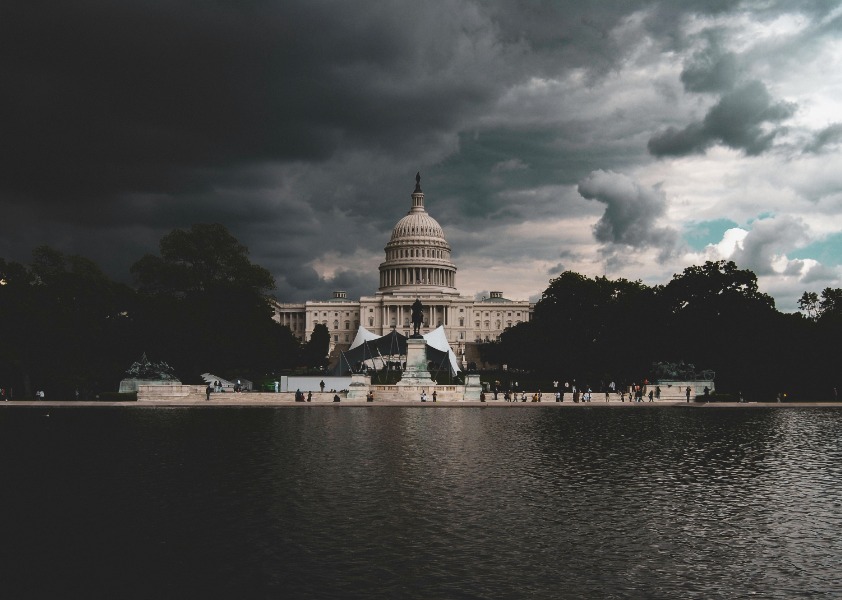Today’s Headlines and Commentary
Since the murder of Washington Post journalist Jamal Khashoggi, the Trump administration twice approved transfers of unclassified nuclear technology to Saudi Arabia, Sen. Tim Kaine said, according to the Hill.
Published by The Lawfare Institute
in Cooperation With

Since the murder of Washington Post journalist Jamal Khashoggi, the Trump administration twice approved transfers of unclassified nuclear technology to Saudi Arabia, Sen. Tim Kaine said, according to the Hill.
The Department of Justice and the House Judiciary Committee continue to spar over access to materials from the special counsel’s investigation. The Committee has threatened to hold the attorney general in contempt, while the department has told the Committee to end such threats before negotiations over the material can resume, the Washington Post reports.
The New York State Senate is considering a privacy bill that, if passed, would become the most protective consumer privacy regime in the U.S., reports Wired.
Huawei Chairman Liang Hua said that the company would be willing to sign “no-spy agreements” with countries including the United States, per NPR. The company is also selling a 51% share of its undersea cable business Huawei Marine Systems, the Wall Street Journal says.
For the second time this week, Australian Federal Police executed a search warrant against journalists for the alleged publishing of classified information, the BBC reports.
Medical testing company LabCorp announced yesterday that a breach through a third-party billing collections firm exposed personal and financial data on 7.7 million of its customers. The same agency, American Medical Collection Agency, recently notified Quest Diagnostics that an intrusion affected the personal, financial and medical data of 11.9 million of their patients, notes The Washington Post.
Federal prosecutors charged an Iranian citizen with violating U.S. export laws and sanctions against Iran, according to indictments unsealed by the United States District Court for the District of Columbia.
Eight U.S. citizens, including six children, captured by Kurdish forces in Northeastern Syria during the campaign against the Islamic State have been repatriated, says the Post.
The Trump administration has banned “people-to-people” travel to Cuba, the Times reports.
ICYMI: Yesterday on Lawfare
Ranj Alaadin described how a clash between the U.S. and Iran involving Iranian proxies could disrupt Iran’s fragile peace.
Stewart Baker offered a modest proposal for preventing election interference in 2020.
Jen Patja Howell shared the most recent episode of the Lawfare Podcast, a conversation with Nada Bakos on her new book, “The Targeter.”
Since the murder of Washington Post journalist Jamal Khashoggi, the Trump administration twice approved transfers of unclassified nuclear technology to Saudi Arabia, Sen. Tim Kaine said, according to the Hill.
The Department of Justice and the House Judiciary Committee continue to spar over access to materials from the special counsel’s investigation. The Committee has threatened to hold the attorney general in contempt, while the department has told the Committee to end such threats before negotiations over the material can resume, the Washington Post reports.
The New York State Senate is considering a privacy bill that, if passed, would become the most protective consumer privacy regime in the U.S., reports Wired.
Huawei Chairman Liang Hua said that the company would be willing to sign “no-spy agreements” with countries including the United States, per NPR. The company is also selling a 51% share of its undersea cable business Huawei Marine Systems, the Wall Street Journal says.
For the second time this week, Australian Federal Police executed a search warrant against journalists for the alleged publishing of classified information, the BBC reports.
Medical testing company LabCorp announced yesterday that a breach through a third-party billing collections firm exposed personal and financial data on 7.7 million of its customers. The same agency, American Medical Collection Agency, recently notified Quest Diagnostics that an intrusion affected the personal, financial and medical data of 11.9 million of their patients, notes The Washington Post.
Federal prosecutors charged an Iranian citizen with violating U.S. export laws and sanctions against Iran, according to indictments unsealed by the United States District Court for the District of Columbia.
Eight U.S. citizens, including six children, captured by Kurdish forces in Northeastern Syria during the campaign against the Islamic State have been repatriated, says the Post.
The Trump administration has banned “people-to-people” travel to Cuba, the Times reports.
ICYMI: Yesterday on Lawfare
Ranj Alaadin described how a clash between the U.S. and Iran involving Iranian proxies could disrupt Iran’s fragile peace.
Stewart Baker offered a modest proposal for preventing election interference in 2020.
Jen Patja Howell shared the most recent episode of the Lawfare Podcast, a conversation with Nada Bakos on her new book, “The Targeter.”
Email the Roundup Team noteworthy law and security-related articles to include, and follow us on Twitter and Facebook for additional commentary on these issues. Sign up to receive Lawfare in your inbox. Visit our Events Calendar to learn about upcoming national security events, and check out relevant job openings on our Job Board.





